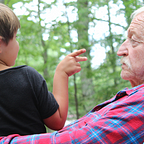1945: I turn six
A Man Who Never Went to War
“The day before the bomb, I went for a swim. In the morning, I was eating peanuts. I saw a light. I was knocked to little sister’s sleeping place.”
- Toshio Nakamura, 10 years old, as told to John Hersey, Hiroshima
The spring of ’45 I turn six and we spend most of summer at our camp in Maine, where Daddy had taught me to swim when I was four. I could swim, really swim. Diving deep into the muddy bottom among the grasses, rotting leaves and reeds, I catch the sun turtles trying to flee me. I like feeling the pressure of the water when I dive down and down.
Daddy’s letters arrived to us at the camp. He writes that the war’s end is near and talks of the bombings of German cities. There are no tears shed, but Daddy notes how this enemy looks a lot like us, blond hair and blue eyes, and that they always try to keep themselves clean, even amidst the destruction.
Then he is sent to the Pacific. He sends us a picture of himself standing on a beach holding a Filipino man over his head like a stick of wood.
One summer day the lake erupts with music and firecrackers. A pilot in a plane named after his mother had dropped the bomb called “Little Boy” and soon my daddy would come home. The Little Boy caused a tremendous thirst among the survivors. A father — a priest — was there:
When he had penetrated the bushes, he saw that there were about twenty men, and they were all in exactly the same nightmarish state: their faces were wholly burned, their eyesockets were hollow, the fluid from their melted eyes had run down their cheeks…Their mouths were mere swollen, pus-covered wounds, which they could not bear to stretch enough to admit the spout of the teapot. So Father Kleinsorge got a large piece of grass and drew out the stem so as to make a straw, and gave them all water to drink that way.
My father returned from the Pacific before the year’s end. I can remember him being in my first grade classroom Christmastime leading us in the Pledge. His brothers and many other uncles and cousins had also returned from the war. They all hated their officers. Uncle Franny told us about an officer who picked up a gun and “just for the heck of it” shot a German man riding his bicycle down a dirt road in the distance.
I remember a dirt road that I walked up and down once a week, up a long sloping hill to the Rebecca Nurse House, a 17th century home where one of the last of the “witches” had lived prior to her being taken to Gallows Hill in Salem. I took piano lessons from a woman who lived there. Some friends thought I was brave to walk home from there in the November dark. But that witch house never bothered me. I feared another, one much larger, built on a hill at the edge of town, the state hospital, the insane asylum, the mad house, what us kids called the “nut house.” I had often overheard talk between adults about what one might expect to find behind the bars up there.
To read more of The Man Who Never Went to War: 1946: I turn seven
